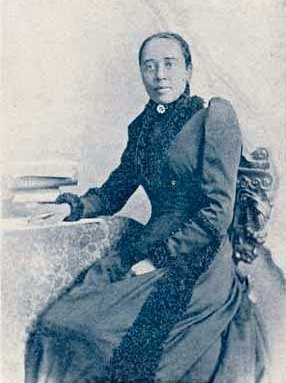Readings for the feast of Anna Julia Haywood Cooper, February 28, 2020:
In our Gospel reading today, Jesus reads from Isaiah when he says,
“The Spirit of the Lord is upon me,
because he has anointed me
to bring good news to the poor.
He has sent me to proclaim release to the captives
and recovery of sight to the blind,
to let the oppressed go free,
to proclaim the year of the Lord’s favor.”
In the case of Anna Julia Haywood Cooper, she met three of those four categories at one time or another, and it was clear the spirit of the Lord was upon her, too. Given the time in which she lived, her accomplishments in her life are the embodiment of the words so dear to us in our Baptismal Covenant, “I will, with God’s help.” Her will, and God’s help, forever changed the dialogue about education and women of color.
Anna was born on August 10, 1859, the daughter of an enslaved woman (Hannah Stanley) and a white man. Some controversy exists over the identity of her father. Most historians presume it was her mother’s master, George Washington Haywood, but others speculate it was George’s brother, Dr. Fabius Haywood. Anna’s mother never revealed the name of Anna’s father.
When she was nine years old, by then the Civil War had ended, and, since she was a bright child, she received a scholarship to attend an Episcopal school that had formed to educate African-American women, St. Augustine’s Normal School and Collegiate Institute, in Raleigh, NC. It was the beginning of a long educational history that would wind its way over many years through several institutions–both as teacher and student. She received her bachelor’s and master’s degrees at Oberlin College; at age 65 she earned a PhD at the Sorbonne, only the 4th African-American woman to hold a PhD. (Technically, her M.A. degree was “honorary”, but it was because she was a woman who had completed the “Gentleman’s” coursework. That said, her PhD was unquestionably “the real deal.”) In between, she worked as a tutor, instructor, school principal, and professor, as well as authoring a book, A Voice from the South. Her book is considered one of the first articulations of black feminism. She had married George A.C. Cooper, the second African-American priest ordained in North Carolina, while at St. Augustine’s, but he died only two years into her marriage. She never remarried.
At a time when most education for African-Americans was geared towards the manual trades and vocational education, she was a counter-voice for higher education as an attainable goal. What Anna couldn’t climb over, she worked around. When she met resistance from the YWCA to allow migrating black women to become members, she created African-American chapters of the YWCA.
Anna was clearly a woman who could use both halves of her brain; her master’s was in mathematics, her PhD thesis was entitled “The Attitude of France on the Question of Slavery Between 1789 and 1848.” When white institutions wouldn’t allow African-American students, she aligned herself with Frelinghuysen University, becoming its second president. Frelinghuysen was a unique institution, holding many of its classes in private homes and businesses, Cooper’s among them. When Frelinghuysen lost its accreditation, (probably to some degree because of its uniqueness and an inability for the status quo to be able to account for that), she transformed the institution into the Frelinghuysen Group of Schools for Colored Working People, still offering as high a quality education as she could under the circumstances. The school only lasted eight years beyond her tenure as president from 1930 to 1942. One can only imagine how Jim Crow played into the struggles she had to keep the institution alive.
When Anna couldn’t climb over or go around a hurdle, she simply outlived it. She died in 1964 at the age of 105. She had outlived slavery. She had outlived the prejudice against higher education for women and people of color. She had outlived some of the worst of Jim Crow. She holds a place in our calendar of saints as a person who embodies the best of the spirit of Jesus, throwing her mind, body, heart, and brain into everything she attempted.
Sadly, though, Jim Crow is not yet dead. How might we use her life as a guiding light to help our own hearts and minds to pick up the gauntlet and keep her dreams alive?
Image: Anna Julia Haywood Cooper, courtesy of Wikimedia Commons.
Maria Evans splits her week between being a pathologist and laboratory director in Kirksville, MO, and gratefully serving in the Episcopal Diocese of Missouri , as the Interim Pastor at Christ Episcopal Church, Rolla, MO.

